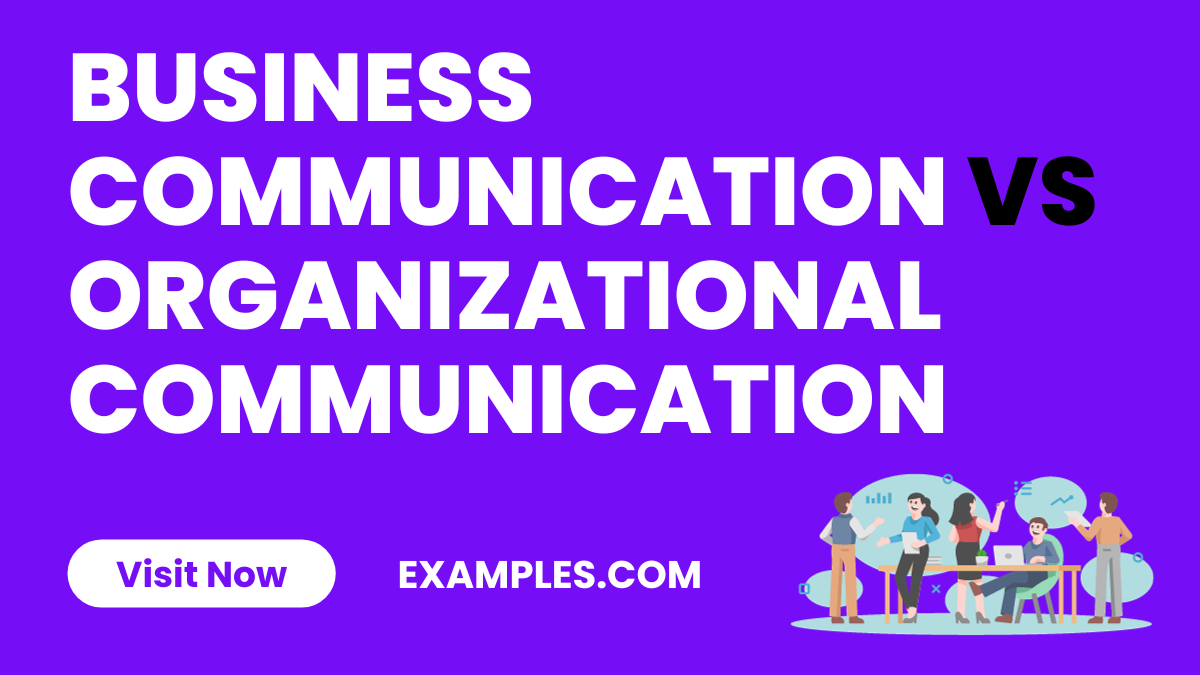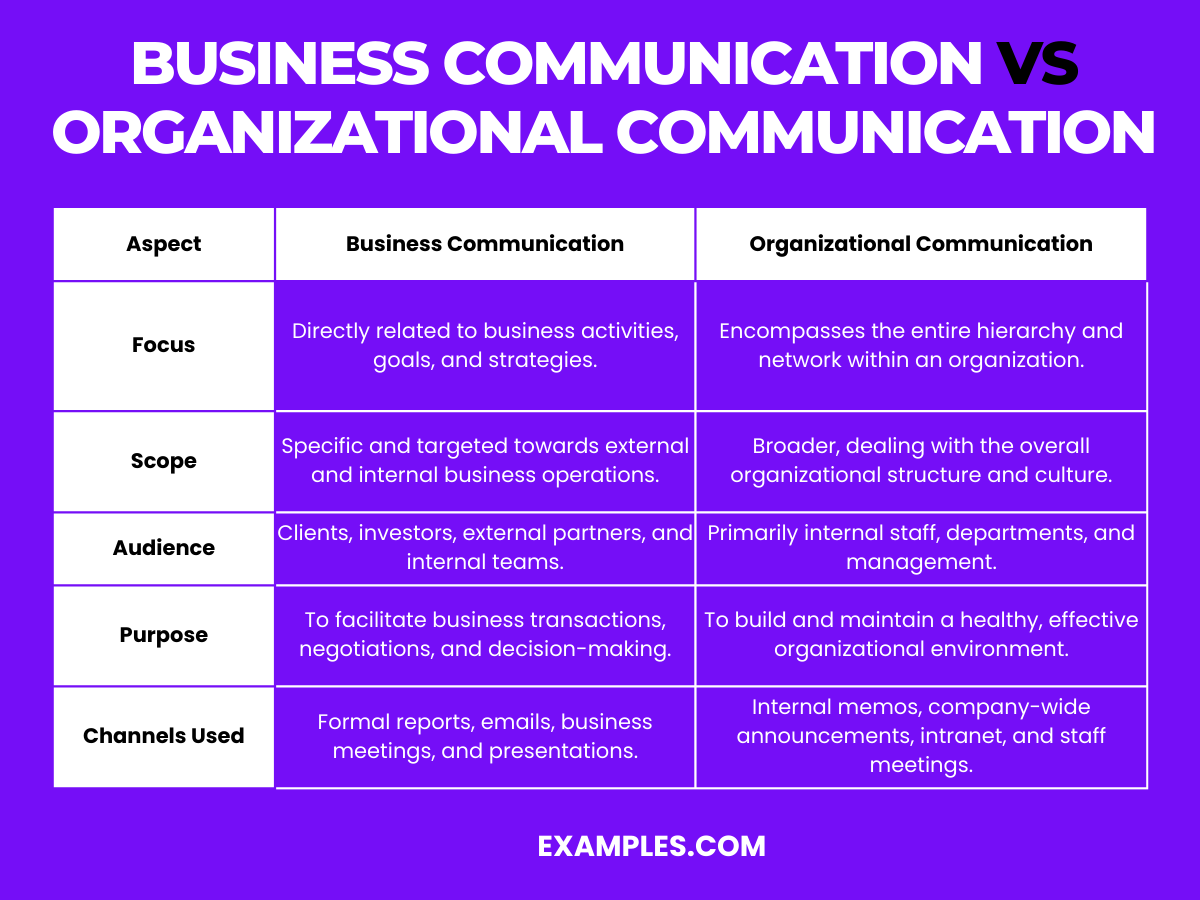Business Communication vs Organizational Communication: Difference Between, Examples, PDF
Exploring the distinction between Business Communication and Organizational Communication, this guide highlights their unique functions and applications in a professional setting. Business Communication is direct, focusing on day-to-day interactions, negotiations, and external relations, exemplified through reports, emails, and client meetings. On the other hand, Organizational Communication takes a wider scope, examining how information disseminates within an organization, shaping its culture and internal relations. This comparison guide, enriched with practical communication examples, aims to provide a deeper understanding of their roles and impact in a corporate environment.
Download Business Communication PDF
Download Organizational Communication PDF
Difference Between Business Communication and Organizational Communication
Understanding the difference between Business Communication and Organizational Communication is key in a professional environment. Business Communication is more transactional, focusing on the day-to-day communication in business activities, such as negotiations, client communications, and reporting. Organizational Communication, in contrast, is broader, focusing on how information flows within an organization, influencing its culture, employee relations, and internal processes. This distinction is crucial for effective management and smooth operational flow.
| Aspect | Business Communication | Organizational Communication |
|---|---|---|
| Focus | Directly related to business activities, goals, and strategies. | Encompasses the entire hierarchy and network within an organization. |
| Scope | Specific and targeted towards external and internal business operations. | Broader, dealing with the overall organizational structure and culture. |
| Audience | Clients, investors, external partners, and internal teams. | Primarily internal staff, departments, and management. |
| Purpose | To facilitate business transactions, negotiations, and decision-making. | To build and maintain a healthy, effective organizational environment. |
| Channels Used | Formal reports, emails, business meetings, and presentations. | Internal memos, company-wide announcements, intranet, and staff meetings. |
| Feedback Loop | Often immediate, focused on efficiency and effectiveness. | Long-term, aimed at employee engagement and organizational development. |
| Tone and Style | Formal, concise, and goal-oriented. | Varies from formal to informal, depending on the internal audience. |
| Outcome Impact | Directly affects business performance and client relationships. | Influences employee morale, internal culture, and overall organizational health. |
This table provides a concise overview of the key differences between Business Communication and Organizational Communication, highlighting how each serves a unique but essential role in the functioning of an organization.
Comparison Between Business Communication and Organizational Communication
The comparison between Business Communication and Organizational Communication can be outlined in the following points:
- Focus: Business Communication centers on information exchange for specific business goals, while Organizational Communication addresses information flow within the entire organization.
- Scope: Business Communication is more targeted and task-specific, whereas Organizational Communication has a broader scope, dealing with internal communication dynamics.
- Audience: In Business Communication, the audience includes both internal teams and external stakeholders; Organizational Communication is primarily internal.
- Purpose: Business Communication is geared towards facilitating business transactions and decision-making, while Organizational Communication aims to foster a positive organizational culture.
- Channels Used: Business Communication often uses formal reports, emails, and meetings, whereas Organizational Communication utilizes internal memos, intranet, and staff meetings.
- Feedback Loop: Business Communication typically involves an immediate feedback mechanism, focusing on efficiency, whereas Organizational Communication encourages long-term feedback for employee engagement and organizational development.
- Tone and Style: Business Communication is generally formal and goal-oriented; Organizational Communication varies from formal to informal, depending on the audience and context.
- Outcome Impact: Business Communication directly impacts business performance and client relations; Organizational Communication influences internal culture and employee morale.
Relationship Between Business Communication and Organizational Communication
The relationship between Business Communication and Organizational Communication can be understood through these points:
- Interdependence: Effective Business Communication often relies on strong Organizational Communication structures.
- Influence on Culture: The way a business communicates internally (Organizational Communication) influences its external business dealings.
- Strategy Alignment: Business Communication strategies are more effective when aligned with the organization’s overall communication culture.
- Employee Engagement: Good Organizational Communication fosters an environment that enhances Business Communication with external stakeholders.
- Feedback Mechanisms: Both use feedback, but in different contexts and for different purposes.
- Change Management: Effective Organizational Communication is essential for implementing changes communicated through Business Communication.
- Crisis Management: Strategies in both areas are crucial during crises, ensuring consistent and clear messaging.
- Training and Development: Skills developed in Organizational Communication can enhance Business Communication techniques.
In conclusion, understanding the nuances between Business Communication and Organizational Communication is essential for any successful organization. Business Communication, focused on specific business goals and interactions, and Organizational Communication, which nurtures the internal communication landscape, are interdependent. Their effective coexistence and alignment are crucial for the overall health of an organization, influencing everything from daily operations to long-term strategic goals. Recognizing their distinct roles yet synergistic relationship is key to fostering a robust organizational environment.



